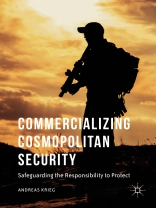This book analyses two key topics within international politics: the responsibility to protect (R2P) and the commercialization and privatization of security. In a world of ungoverned spaces, state failure and erupting humanitarian crises, the international community is increasingly called upon to exercise its responsibility to protect communities under threat. Here, Krieg explains the civil-military dynamics behind the state’s failure to effectively intervene in humanitarian crises overseas using its serviceman. The central question that follows is: would the private military contractor be a better alternative agent of the state in humanitarian intervention? This book demonstrates that given his professional identity and role towards client state and public, the contractor can be employed effectively in humanitarian intervention to generate more ethical outcomes. This volume is essential reading for researchers and post-graduate students of R2P, International Security Studies and privatization, as well as Peace and Conflict studies and International Relations more broadly.
Cuprins
Chapter 1: The Nature of Civil-Military & Civil-Contractor Relations.- Chapter 2: Understanding the Changing Nature of Conflict against the backdrop of Globalization.- Chapter 3: Considering the Argument for the Cosmopolitan Responsibility to Protect.- Chapter 4: Ethical Conduct in Humanitarian Intervention.- Chapter 5: Civil-Military Constraints on Strategic and Operational Decision-Making in Humanitarian Intervention.- Chapter 6: The Soldier as a Cosmopolitan Security Provider.- Chapter 7: The Strategic Decision of Employing the Contractor in Humanitarian Intervention.- Chapter 8: The PMC’s Corporate Decision-Making in Humanitarian Intervention.- Chapter 9: The Moral Worth of the Contractor as a Cosmopolitan Agent.
Despre autor
Andreas Krieg is an assistant professor in Defence Studies at King’s College London currently seconded to the military Staff College in Qatar. Dr Krieg is a specialist in military and security affairs with a particular regional focus on the Middle East. In his research he focuses inter alia on civil-security sector relations and the ethics of war.












